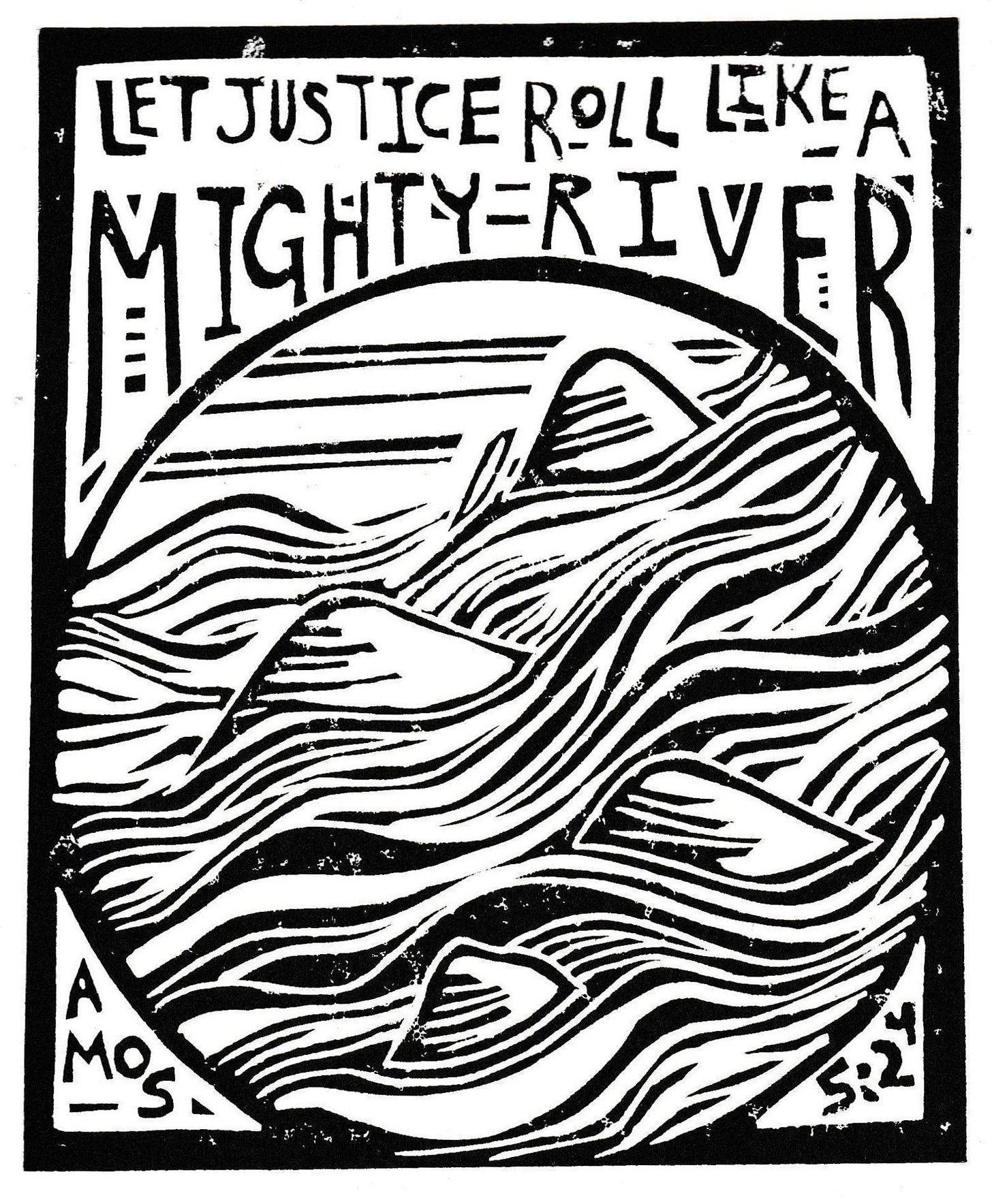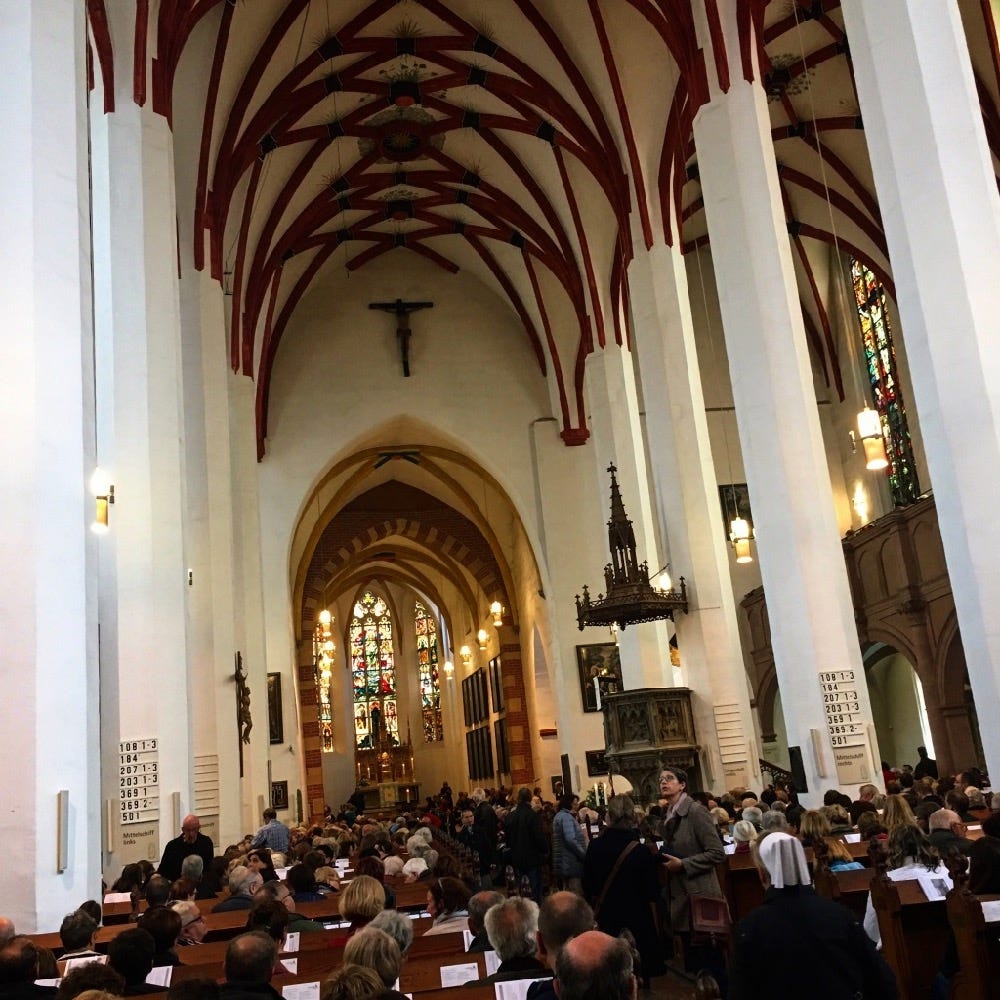 |
| Yoram Raanan, Har Sinai Bavli, oil on canvas and book cover collage, 2019 |
I love Chaim Potok's books. This article gives me even more reason to love them. "Potok’s best novels probe what it means to 'hold' to tradition in a new, changed way." I follow a lot of people who talk about deconstruction of their childhood Christian faith. This article speaks to the fear that if you deconstruct too much, you won't be a Christian at all. I am drawn to the "second naiveté" this author writes of.
At the heart of Chaim Potok’s 1985 novel Davita’s Harp is a child who is searching for faith. The parents of Ilana Davita Chandal offer little help. Her father was raised Christian in New England but has abandoned his earlier Evangelical fervor. Her mother, a Polish Jewish immigrant, has given up observance of the mitzvot and joined the Communist Party; she is now committed to fighting the fascism she hears is on the verge of consuming Western Europe. Through much of the book, Davita seems unsettled by the snatches of religious language and observance she is able to pick up. When her aunt urges her to have faith in Jesus, Davita raises the classic Jewish objection: “Why is there a war in Spain if Jesus is the Prince of Peace?” Later, when Davita finds her mother’s King James Bible and takes it to synagogue, she horrifies her peers: “They all backed away a step or two as if I were holding in my hand a specimen of forbidden vermin.” “That’s a goyische Bible,” her friend tells her, making her blush with shame. “I did not go back to that synagogue for a long time,” Davita says.
Yet in 1937, she does return, after learning of her father’s death in the bombing of Guernica, where he had been working as a journalist. It is one of the novel’s pivotal scenes. Davita goes back to a synagogue and, finding herself in a kind of daze, says softly aloud the Kaddish, the traditional doxology that asks for the sanctification of God’s name. Davita mouths the words in memory of her father. She can see the men’s side of the synagogue through the curtain. She watches the men rise.
And then I was on my feet too, listening to the voices on the other side of the curtain and reciting faintly with the men the words of the Kaddish, which I found, to my astonishment, that I knew by heart. There was a surge of whispering, a soft surflike rush of sound from the women around me. Someone said, “What is she doing?” Another said something in Yiddish. I stood, quietly reciting the words. There has to be more for you, Papa, than just one memorial service. Can one recite the Kaddish for a father who wasn’t a Jew? I didn’t care. I went on. The Kaddish ended. I sat down and closed my eyes, feeling upon my face the hot stares of all those nearby.
The service went on. Then, moments later, I heard again the words of the Kaddish, and I rose and began to recite them too, louder this time, and I thought I heard one or two of the women answer, “Amen.”
Maybe it is because I think about Paul Ricoeur’s diagnosis of modern readers of the Bible and would-be believers in its God – “Beyond the desert of criticism, we wish to be called again” – that I am tempted to regard Davita’s budding curiosity about Judaism as one of the most immediately relatable entries into Chaim Potok’s work as a whole. A religiously observant life is less and less accessible or intelligible to modern Westerners, yet many of us remain haunted by its possibility. Even the demographic designation “nones” invokes religious sensibility by naming its absence, tacitly acknowledging that, even in the desert, faith’s echo can be heard. Davita’s halting entry into an observant life dramatizes a journey we too might take. Her story makes the prospect of finding a home within a religious tradition, even in a secular age, a live, beguiling one.
Herman Harold Potok was born on the eve of the Depression in the Bronx. The son of distinguished Hasidic parents, Chaim – as he was known at home and later in the world of literature – grew up in a devout and strictly observant Jewish community. He attended the more liberal Yeshiva University’s boys’ high school and later the university itself in New York and was ordained to the (even more liberal, by the standards of his childhood) Conservative rabbinate after training for four years at the Jewish Theological Seminary, also in New York. Eventually he earned a doctorate in philosophy at the University of Pennsylvania, in order, he said, “to see what the center of the Western World was really like.” He started writing fiction in high school, despite the fact that his fellow Hasidim regarded it “at best as a frivolity, and at worst as a menace,” as he would later put it. Talmudic scholarship was an admirable aim for a Jewish boy of Potok’s world; becoming a writer of stories was not.
Potok published his first novel in 1967, when he was thirty-eight years old. The Chosen spent over six months on the New York Times bestseller list and was a finalist for the National Book Award. Like its eventual successor Davita’s Harp, The Chosen is chiefly interested in what an observant Jewish life might look like in a modern Western context, but it comes at the matter from the other direction. Where Davita tiptoes her way into shul attendance and the study of Talmud, the protagonists of The Chosen can’t remember a time when they weren’t immersed the world of Judaism. For them, the question isn’t about how to be at home in a forbiddingly strict and insular realm of piety but about how to embody their devotion to it within a wider secular culture that has little use for it – and how to allow that world’s ideals to challenge the way they practice their Judaism, too.
In The Chosen, Danny Saunders is the son of his tight-knit Brooklyn community’s formidable rebbe, which in the Hasidic tradition means he is also his father’s designated successor. In high school, however, he secretly studies Sigmund Freud and yearns for graduate studies in psychology. The tension between his Hasidic identity and his apparent destiny on the one hand, and his burgeoning thirst for secular learning on the other, is unrelieved throughout most of the novel. At the climax, we see Danny refuse the choice: he will go on to become a psychologist, studying among the goyim, but he will remain an observer of the commandments, albeit not as a rabbi.
A religiously observant life is less and less accessible to modern Westerners, yet many of us remain haunted by its possibility.
The same tension animates all of Potok’s best novels. In his second, The Promise, Reuven Malter is studying at an Orthodox rabbinical school under the watchful and forbidding ministrations of Rav Kalman, a Holocaust survivor who views Reuven’s father’s secular Zionism and historical-critical interpretations of the Talmud with suspicion and fear, and who watches for, and prepares to stifle, signs of their influence on Reuven. As Reuven begins to prepare for his ordination exams, Rav Kalman urges him away from modern critical approaches to the sacred page. One of the novel’s most thrilling scenes is Reuven’s oral examination. For anyone who has studied Jewish or Christian scripture in their original Hebrew and Greek, and who has pored over commentaries on both, as I have, it is hard to overstate how well Potok manages to evoke the tingling excitement a student can experience when performing a close reading of a text. At one point during Reuven’s examination Rav Kalman draws his attention to a passage from the Mishnah, the second-century CE collection of the so-called “Oral Torah,” part of the rabbinic tradition of Talmudic interpretation. Here is how Reuven, called upon to explain the passage, describes the scene:
It was one of the passages I had been waiting for. There were others like it scattered all through the Talmud. Sooner or later I would have managed to steer us onto one, or we would have come across one by ourselves. Now I was in it and explaining it and knowing exactly what words I would use and seeing it all half a dozen steps in advance like a chess game.
The scene climaxes with Reuven’s rabbinical examiners listening open-mouthed as Reuven demonstrates his mastery of the Talmud as well as of modern critical approaches to its study, even as he declares that he will remain an observant Jew and protect the sanctity of the Pentateuch as divinely given.In the Beginning, published six years after The Promise, goes even further into the territory of modern critical study. Its protagonist, David Lurie, a yeshiva student, tells his father that not only does he want to know about modern critical approaches to Talmud, he also wants to see how secular university researchers and lecturers apply them to scripture itself. His father responds, “Tell me what it means to study Bible in a university. Your teachers will be goyim?” David says there will be Jews at the university too, though not all will be observant. “How can a goy who believes in Jesus or in nothing teach a Jew the Torah? How can a sinful Jew teach the Torah?” his father retorts. But David, like Reuven Malter, refuses to accept his father’s presumption that critical study of the Bible and an observant Jewish life must necessarily be in conflict. In a moving moment, one generous rabbi offers private encouragement to David not to shy back from the university but to bring the fruits of his learning back to his Orthodox community afterwards:
Lurie, if the Torah cannot go out into your world of scholarship and return stronger, then we are all fools and charlatans. I have faith in the Torah. I am not afraid of truth.… I want to know if the religious world view has any meaning today. Bring yourself back an answer to that, Lurie. Take apart the Bible and see if it is something more today than the Iliad and the Odyssey. Bring yourself back that answer, Lurie.
In what is for me Potok’s most disturbingly powerful achievement of all, his third novel, My Name Is Asher Lev, we meet another young Brooklyn Hasid, the son of inspiringly just and devout parents, this one with a gift for art. Through his adolescence, Asher Lev devotes all his attention to drawing and painting, to the bafflement and then to the hurt and angry bewilderment of his family and wider Orthodox community. Several years later, after he gains notoriety as an artist, Asher is driven to try to depict the pain he had watched on his mother’s face as she parented him alone while his father traveled the world at the rebbe’s request, rescuing persecuted Jews. Asher had watched her standing in pain astride the gap between her devout, traditionalist husband and the defiant son who could never understand – or be understood by – his father. What other symbol could possibly suffice for this depiction, Asher asks himself, than the form of the cross, the same symbol under which the Jews his father spent his life rescuing were driven from their homes and killed in pogroms? When Asher’s parents attend his show at a prominent New York gallery, Asher watches in agony as his father glimpses his final two paintings, Brooklyn Crucifixion I and II, in which his mother occupies the center, “tied to the vertical and horizontal lines.”
Then my father moved toward the paintings. I saw him bend to read the titles. His shoulders stiffened. Then he saw the name of the museum that had purchased the paintings. He straightened slowly. He turned and looked at me. His face wore an expression of awe and rage and bewilderment and sadness, all at the same time.… Who are you? the expression said. Are you really my son?… He did not speak to me.
Like Potok’s characters Danny Saunders and David Lurie, Asher Lev is compelled to venture beyond the confines of his father’s carefully circumscribed world, but he does so without abandoning his Judaism. He cannot be a Hasid, but he chooses to remain an observer of the commandments.
One of Potok’s sharpest and most sympathetic critics, Daniel Walden, founder of the Jewish Studies Program at Penn State, says that every Potok novel always circles around two basic questions: “1) how to live as an observant Jew in a secular society, and 2) to what degree [one can] hold to the tradition of Orthodox separateness in a secular society.” I think that is true as far as it goes, but Potok’s best novels (with Davita’s Harp the exception, as I earlier hinted) probe what it means to “hold” to tradition in a new, changed way. Potok’s Hasidic protagonists never give up Jewish observance, but they do, all of them, practice their Judaism in a way that represents a genuine break with their past understandings and practices of it. The Hebrew Bible scholar Jon Levenson, from his perspective as an observant Jew who teaches at Harvard, has remarked on the ability of some religious scholars, Jews and Christians alike, to hold together their use of modern critical biblical studies with an ongoing faith in their inherited religious traditions. In this way, Levenson says, using Ricoeur’s phrase, “the ‘second naiveté’ of those touched by historical criticism is to be distinguished from the innocence of the orthodox believer who has never become aware of the historical context and who does not feel the claim of historical investigation.” The novels of Chaim Potok dramatize young Jews finding their way to forms of Jewish life they wish to hold on to – their “second naiveté” – but at the real cost of leaving behind their former innocence and shocking or even alienating their communities of origin in the process.
It is this aspect of Potok’s work – his portrayal of young religious fundamentalists who are confronting modernity and negotiating their tradition in the process – that I think explains my initial enthrallment with his novels when I discovered them in my early twenties. There was, at first, a shock of recognition: I, a Gentile and an Evangelical Christian, knew something of what it was like to grow up in Potok’s world. The theorist and professor Michael Warner has spoken of the Pentecostal church culture of his childhood as a “profoundly hermeneutic” one: “Where I come from, people lose sleep over the meanings of certain Greek and Hebrew words. … Being a literary critic is nice, I have to say, but for lip-whitening, vein-popping thrills it doesn’t compete. Not even in the headier regions of Theory can we approximate that saturation of life by argument” – by ongoing contestation, that is, of the sentences and paragraphs of Scripture.
That captures my childhood church and family culture too, perfectly, and to this day I haven’t lost the conviction that when one is reading the Bible, the stakes are high. The agonies and desperations of Potok’s characters are instantly recognizable to me. (“Even though the faith Potok writes of is orthodox or Hasidic Judaism, Evangelical readers [and there are many] find themselves understanding and empathizing with the conflicts he presents,” wrote Cheryl Forbes in Christianity Today in 1978.)
Potok’s best novels probe what it means to “hold” to tradition in a new, changed way.
I was also drawn to the extraordinary depictions of friendship between young men in Potok. Daniel Walden says that the friendship Danny Saunders and Reuven Malter enjoy in The Chosen is “a kind of love story,” which I take to be a clumsy effort to sum up the way their relationship isn’t romantic and yet is obviously much more intimate than what one often encounters in similar portrayals – or in real life, for that matter. Daniel Boyarin, professor of Talmudic cultures at Berkeley, has made the case that “Judaism provides exempla for another kind of masculinity, one in which men do not manifest ‘a deeply rooted concern about the possible meanings of dependence on other males.’” Potok’s novels themselves provide some of these exempla, as their male characters confide their secrets in one another, confess to each other their insecurities and ambitions, and at times weep with or in front of each other. In my post-college years of loneliness, angst, and longing for male friendship, I found this aspect of Potok’s novels almost unbearably poignant.
But their primary source of power for me comes from their dramatization of the quest to retain one’s childhood faith in a new, altered form. I recall taking courses in the Hebrew text of the Old Testament and the Greek text of the New Testament at a conservative Christian college and learning, for the first time, about biblical criticism. I learned about what textual critics call variants – differences in wording and syntax of biblical verses that appear in various extant manuscripts, forcing translators to choose which ones they think are best supported over others they find less likely to be original. I was forced to grapple with tensions within the canonical texts that I had never noticed before. Mark 10:46, for example, says: “And as he [Jesus] was leaving Jericho with his disciples and a great crowd, Bartimaeus, a blind beggar, was sitting by the roadside.” But in Luke’s version (18:35), Jesus notices the blind beggar as he arrives at Jericho. Matthew’s Gospel has Judas committing suicide by hanging (27:3–10), whereas the Book of Acts has him die by falling and gashing his abdomen open (1:18–19). What, I wondered, did tensions like this mean for belief in the Bible’s inerrancy – its status of being inspired, without falsehood in matters of doctrine as well as historically and scientifically accurate? Reading Potok, I met characters who lost sleep over questions like this too.
I read a lot these days about “exvangelicals” – people who had upbringings like mine who now want nothing to do with them, people who have left Evangelical Christianity behind for good, owing variously to its anti-intellectual impulses; its demand for cultural and political conformity; its tribal disdain for those deemed outsiders; its inability to self-criticize, with sometimes abusive results; or all of the above. I understand and sympathize with the “exvangelicals.” In many ways, I am one. Like Potok’s characters, I went away to university and experienced something of the wider world beyond the confines of my Baptist, Republican childhood. I now make use of historical critical tools in my biblical scholarship and seminary classroom, and I am now a member of the Episcopal Church, which, to my childhood eyes, was barely a church at all.
I can’t be the Christian I used to be, but I want still, very much, to be a Christian.
Even so, the Evangelical faith in which I was nurtured continues to beguile, inspire, and compel me in ways I am still discovering. I can’t be the Christian I used to be, but I want still, very much, to be a Christian. Potok’s characters help me understand my complicated feelings. They are not only interested in the deconstructive moment, in which childhood certainties are relinquished. They strive also for the chastened second naiveté, on the far side of the desert of criticism, that will make it possible for them to go on being faithfully Jewish.
The eighteenth-century aphorist G. C. Lichtenberg says there is “a great difference between believing something still and believing it again.” The novels of Chaim Potok show us what the latter looks like, and in doing so, make believers like me feel much less alone.
In 1976, after the publication of In the Beginning, Potok talked with interviewer Harold Ribalow. Ribalow asked, “Why do you think non-Jews read your books?” Potok replied:
What non-Jews are doing – if I can get it from the letters they are sending me – is that they are simply translating themselves into the particular context of the boys and the fathers and the mothers and the situation that I’m writing about. So instead of being a Jew, you are a Baptist; instead of being an Orthodox Jew, you are a Catholic; and the dynamic is the same. The particular words or expressions that might be used might be Jewish or what have you, but they are simply putting themselves in the place of the subculture which is clashing core to core with the umbrella culture in which we all live.
It is no accident, probably, that Potok mentions Baptists and Catholics as the closest kin to the characters in his novels. “The Hebrew Torah is,” according to Gerald Bruns, “a monumental example of a binding text; its significance lies not only in what it contains or means but also in its power over those who stand within its jurisdiction.” Just this is the situation of those Christians – like the Baptists I grew up among – whose Bible exercises supreme authority in their traditions. For any readers, then, who treat Scripture as a “binding text,” for any so-called “people of the Book,” who, by dint of historical time and circumstance, must live with others who are not so bound and who marshal weighty arguments for their freedom, the novels of Chaim Potok will go on providing guidance and solace.














